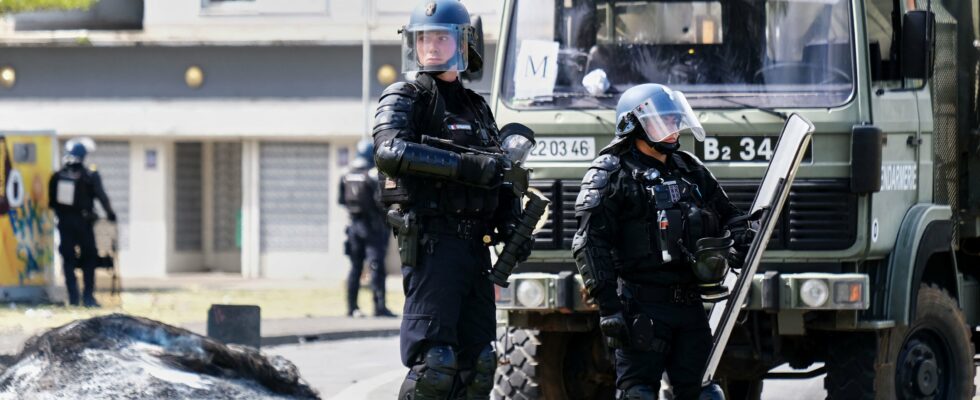Faced with the riots in New Caledonia, the executive is playing the card of firmness. Emmanuel Macron announced this Wednesday, May 15, the establishment of a state of emergency on the archipelago, where there are now four deaths, including a gendarme, and hundreds of injured. “All violence is intolerable and will be the subject of an implacable response to ensure the return of republican order,” declared the Elysée following a Defense and National Security Council, adding that the Head of State “requested that the decree aimed at declaring a state of emergency in New Caledonia be included on the agenda of the Council of Ministers which will meet at 4:30 p.m.”.
Already this Tuesday, the leader of the loyalists in Nouméa, former minister Sonia Backès, had demanded the establishment of this state of emergency from the executive, warning that it was a situation of “civil war”.
The Republicans had also called for the establishment of this exceptional regime, through their leader Eric Ciotti. “We must also mobilize the army. Today, the police are insufficient in number. It is surprising that there was not more preparation, not more law enforcement” , he denounced, also calling for “house arrests” for “the most dangerous” people.
Additional restrictions
This exceptional regime, already established eight times previously in France, can be decreed in the event of imminent danger (attack, war) or public calamity (natural disaster of exceptional magnitude). Created in 1955, during the Algerian War, the state of emergency allows ministers and prefects to “prohibit the movement of people or vehicles” in certain places or at certain times (curfews), as well as meetings or demonstrations on public roads, or to order the surrender of weapons. The State can also place house arrest on any person “with respect to whom there are serious reasons to believe that his behavior constitutes a threat to public security and order” and order “searches in any place, including a home” with a few rare exceptions.
Decided by decree in the Council of Ministers, the initial duration of the state of emergency is twelve days. It can be established over all or part of the territory. Its extension must be authorized by Parliament with the passing of a law. Since 2016, the law provides that the National Assembly and the Senate can control and evaluate the measures taken by the government.
Already implemented in New Caledonia
A state of emergency has already been declared eight times. Notably three times during the Algerian War: in the spring of 1955 in French Algeria and twice in mainland France, in 1958 and in 1961 (for two years).
A state of emergency was also implemented once in New Caledonia in January 1985 (for just over five months). After the elections of November 1984 which were to establish a new status, the tension between Kanak separatists and “Caldoches” had worsened: roadblocks, fires, fatal clashes, including an ambush during which ten separatists were killed. On January 11, 1985, the murder of a 17-year-old European provoked a huge demonstration accompanied by abuses and it was the next day that a state of emergency was proclaimed.
For the same reasons, another will be ordered on October 29, 1986 in Wallis and Futuna (until the next day) and on October 24, 1987 in part of the territory of Polynesia (until November 5). In mainland France, it will be instituted again on November 9, 2005 after the riots in the suburbs, and following the attacks in Paris and Saint-Denis on the evening of November 13, 2015 on mainland territory and in Corsica (for almost two years). More recently, the establishment of a state of emergency was called for, in vain, in February by the president of LR, Eric Ciotti, in Mayotte. And by the right and the far right in the face of the urban violence triggered last summer by the death of young Nahel.
The state of health emergency, which also allows curfew measures or travel restrictions to be taken without the vote of a new law by Parliament, was also established from March 2020, for more than ‘one year, due to the Covid epidemic.
